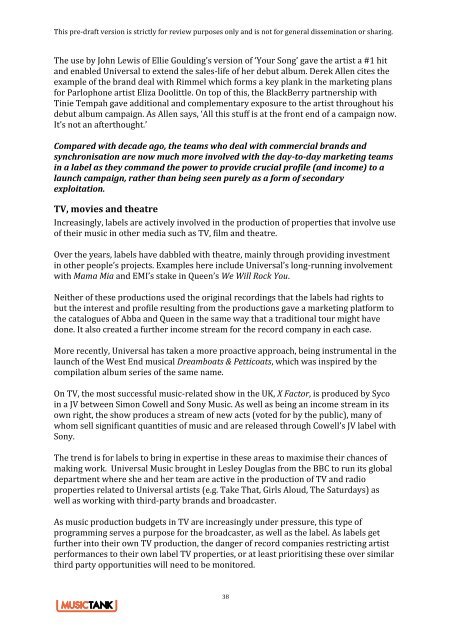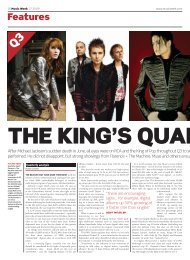Remake, Remodel: The Evolution Of The Record Label
Remake, Remodel: The Evolution Of The Record Label
Remake, Remodel: The Evolution Of The Record Label
You also want an ePaper? Increase the reach of your titles
YUMPU automatically turns print PDFs into web optimized ePapers that Google loves.
This pre-draft version is strictly for review purposes only and is not for general dissemination or sharing.<br />
<strong>The</strong> use by John Lewis of Ellie Goulding’s version of ‘Your Song’ gave the artist a #1 hit<br />
and enabled Universal to extend the sales-life of her debut album. Derek Allen cites the<br />
example of the brand deal with Rimmel which forms a key plank in the marketing plans<br />
for Parlophone artist Eliza Doolittle. On top of this, the BlackBerry partnership with<br />
Tinie Tempah gave additional and complementary exposure to the artist throughout his<br />
debut album campaign. As Allen says, ‘All this stuff is at the front end of a campaign now.<br />
It’s not an afterthought.’<br />
Compared with decade ago, the teams who deal with commercial brands and<br />
synchronisation are now much more involved with the day-to-day marketing teams<br />
in a label as they command the power to provide crucial profile (and income) to a<br />
launch campaign, rather than being seen purely as a form of secondary<br />
exploitation.<br />
TV, movies and theatre<br />
Increasingly, labels are actively involved in the production of properties that involve use<br />
of their music in other media such as TV, film and theatre.<br />
Over the years, labels have dabbled with theatre, mainly through providing investment<br />
in other people’s projects. Examples here include Universal’s long-running involvement<br />
with Mama Mia and EMI’s stake in Queen’s We Will Rock You.<br />
Neither of these productions used the original recordings that the labels had rights to<br />
but the interest and profile resulting from the productions gave a marketing platform to<br />
the catalogues of Abba and Queen in the same way that a traditional tour might have<br />
done. It also created a further income stream for the record company in each case.<br />
More recently, Universal has taken a more proactive approach, being instrumental in the<br />
launch of the West End musical Dreamboats & Petticoats, which was inspired by the<br />
compilation album series of the same name.<br />
On TV, the most successful music-related show in the UK, X Factor, is produced by Syco<br />
in a JV between Simon Cowell and Sony Music. As well as being an income stream in its<br />
own right, the show produces a stream of new acts (voted for by the public), many of<br />
whom sell significant quantities of music and are released through Cowell’s JV label with<br />
Sony.<br />
<strong>The</strong> trend is for labels to bring in expertise in these areas to maximise their chances of<br />
making work. Universal Music brought in Lesley Douglas from the BBC to run its global<br />
department where she and her team are active in the production of TV and radio<br />
properties related to Universal artists (e.g. Take That, Girls Aloud, <strong>The</strong> Saturdays) as<br />
well as working with third-party brands and broadcaster.<br />
As music production budgets in TV are increasingly under pressure, this type of<br />
programming serves a purpose for the broadcaster, as well as the label. As labels get<br />
further into their own TV production, the danger of record companies restricting artist<br />
performances to their own label TV properties, or at least prioritising these over similar<br />
third party opportunities will need to be monitored.<br />
38



